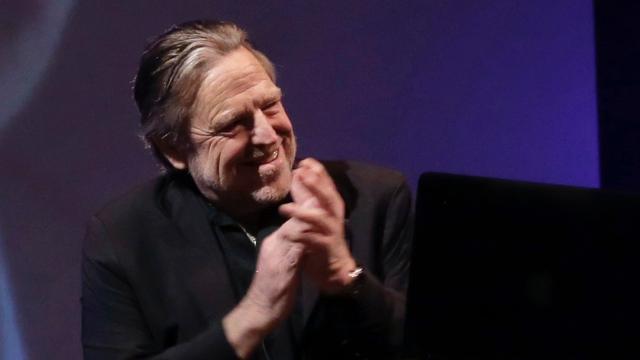John Perry Barlow, co-founder of the Electronic Frontier Foundation and author of the 1996 manifesto, “A Declaration of the Independence of Cyberspace,” has died. He was 70 years old.
Barlow was a seminal child of the 1960s who took LSD with Timothy Leary, wrote lyrics for the Grateful Dead, and eventually became an internet activist in the 1980s and 90s. Barlow cofounded the Electronic Frontier Foundation (EFF) in 1990 to advocate for digital rights and was a regular in the pages of Wired after the magazine was started in 1993.
The EFF announced Barlow’s death in a blog post late yesterday, announcing that the organisation would, “continue the work to fulfil his dream.”
“It is no exaggeration to say that major parts of the Internet we all know and love today exist and thrive because of Barlow’s vision and leadership,” wrote the executive director of the EFF, Cindy Cohn.
“He always saw the Internet as a fundamental place of freedom, where voices long silenced can find an audience and people can connect with others regardless of physical distance.”
Barlow’s famous manifesto, “A Declaration of the Independence of Cyberspace,” attempted to claim the internet as a new space that shouldn’t be regulated by governments.
It began:
Governments of the Industrial World, you weary giants of flesh and steel, I come from Cyberspace, the new home of Mind. On behalf of the future, I ask you of the past to leave us alone. You are not welcome among us. You have no sovereignty where we gather.
It’s a soaring document that’s worth reading in its entirety, and was praised by many people who were just getting online in the early 90s with the emergence of the world wide web. But it also drew harsh criticism from many who disagreed with Barlow’s libertarian take on the emerging internet.
The EFF’s post announcing Barlow’s death even addressed the more controversial aspects of his activism, including criticisms that he was a techno-utopian who didn’t understand the dark side of the technological revolution that was to come.
Barlow was sometimes held up as a straw man for a kind of naive techno-utopianism that believed that the Internet could solve all of humanity’s problems without causing any more. As someone who spent the past 27 years working with him at EFF, I can say that nothing could be further from the truth. Barlow knew that new technology could create and empower evil as much as it could create and empower good. He made a conscious decision to focus on the latter: “I knew it’s also true that a good way to invent the future is to predict it. So I predicted Utopia, hoping to give Liberty a running start before the laws of Moore and Metcalfe delivered up what Ed Snowden now correctly calls ‘turn-key totalitarianism.’”
Barlow’s manifesto, and even his later statements, largely ignored or played down the fact that the US government and intelligence agencies literally invented the internet. To Barlow, cyberspace was a frontier that he and others could conquer and government had no claim on the space.
Whether you loved Barlow or thought him a fool, there’s no question that he was an important figure in the transformation of this strange space we call the internet and his passion for individual rights was unmatched. He will be missed by many.
[EFF]
